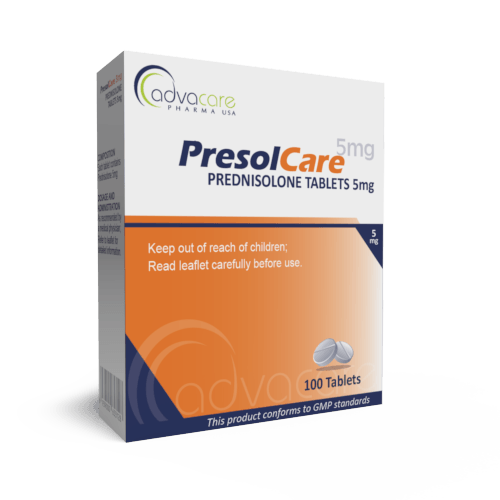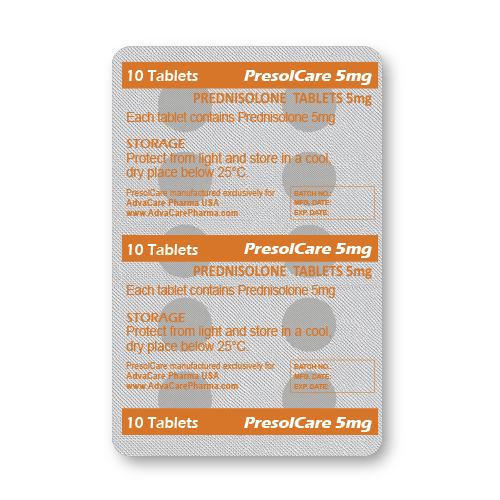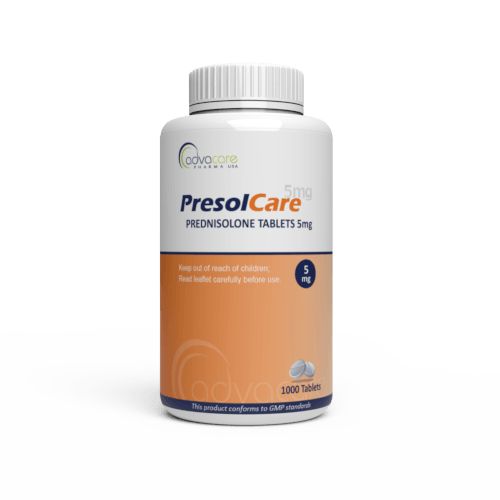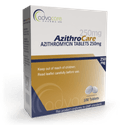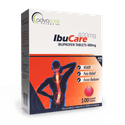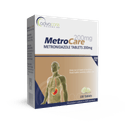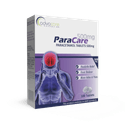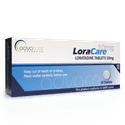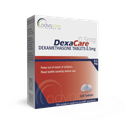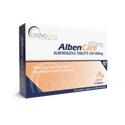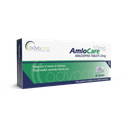- Home›
- Pharmaceuticals›
- Pharmaceutical Tablets›
- Prednisolone Tablets
Prednisolone Tablets
Dosage
Packaging
What is Prednisolone?
Active Ingredients: Prednisolone
Prednisolone Tablets are a steroid drug used to treat a wide range of inflammatory and autoimmune diseases, such as asthma, uveitis, rheumatoid arthritis, ulcerative colitis, and temporal arteritis. This medication helps to relieve swelling, itching, redness, and other symptoms associated with inflammation.
Prednisolone is also used in organ transplant recipients to reduce the likeliness of organ rejections, and this drug may be used in combination with chemotherapy for certain types of cancer.
Prednisolone is classified as a glucocorticoid within the corticosteroid family of medicines. It works by preventing inflammation and lowering the body's natural defense. Though the exact mechanism of anti-inflammatory action is unknown, prednisolone can suppress the immune system by reducing the activity and production of lymphocytes and eosinophils.
This medication is available as a tablet or as Prednisolone Syrup. Tablets offer a simplified and convenient regimen for patients who have no difficulty swallowing. Tablets typically have a longer shelf life and offer a reduced risk of measurement errors. Oral solutions are typically preferred for pediatric patients and those who have difficulty swallowing tablets. It also allows for more accurate dosing for children, as their dosage is based on weight, and their dosage may be more frequently changed.
AdvaCare Pharma is a trusted supplier of Prednisolone Tablets. Our supply chain is thoroughly vetted to ensure it meets health, safety, and environmental standards. This medication is produced in our GMP-certified manufacturing facilities in China, India, and the USA.
Why are we a top Prednisolone manufacturer?
AdvaCare Pharma is a trusted Prednisolone manufacturer committed to providing quality-assured, cost-effective pharmaceuticals for an ever-changing global market. Manufacturing a wide range of 200+ pharmaceutical products in tablet form, we ensure that all of our oral solid dosage forms adhere to stringent GMP standards.
We operate according to a unique "vested supplier-distributor relationship" business model, in which we tie our success in a market to that of our distributor. Such a model facilitates a closer relationship by working together to achieve pre-defined goals for market entry and expansion. As a Prednisolone manufacturer and global supplier, we implement unique strategies to ensure successful distribution.
Uses
What is Prednisolone used for?
It is used to reduce inflammation and slow down the immune system. Prednisolone is used in the treatment of many inflammatory conditions such as asthma, uveitis, rheumatoid arthritis, lupus, allergic disorders, ulcerative colitis, and temporal arteritis. It can be used to treat conditions that affect many parts of the body, including the skin, eyes, lungs, stomach, nervous system, or blood.
How should Prednisolone Tablets be used?
This medication is intended to be taken orally. Prednisolone Tablets should be taken after a meal.
Is it safe to abruptly stop taking Prednisolone?
It is not advised to suddenly stop taking this medication. If an individual abruptly stops taking Prednisolone, or tapers too quickly, they may experience steroid withdrawal symptoms. In addition, the abrupt discontinuation may worsen symptoms of the treated condition. It is important to consult with a healthcare professional to properly taper from this medication. The exact tapering schedule will depend on the dose and duration of treatment and additional medical considerations including the condition being treated.
What dose should be taken?
Recommended dosage varies based on different medical conditions.
Adult Dosing Recommended dosage may vary based on different medical conditions:
- For corticosteroid-responsive conditions, the usual dose is 5-60mg per day. The exact dose and frequency vary by condition.
- For acute asthma, the usual dose for ED or hospital management is 40-80mg per day, divided and taken once or twice. Continue treatment until a peak flow rate of 70% is met. For outpatient burst treatment, the usual dose is 40-60mg per day, divided and taken once or twice. Treatment should continue for 3-10 days.
- For severe persistent asthma, the usual dose is 7.5-60mg, taken once per day or every other day. When discontinuing high-dose or long-term treatment, the dose should be gradually tapered.
- For adrenal insufficiency, the usual dose is 4-5mg/m^2 per dose, taken once each day.
- For acute exacerbation of multiple sclerosis, the usual dose is 1250mg, taken once per day for 3-5 days.
- For acute gout, the usual dose is 0.5mg/kg per day, for 5-10 days.
- For acute alcoholic hepatitis, the usual dose is 40mg, taken once per day. The dose should be gradually tapered when discontinuing treatment.
- For primary focal segmental glomerulosclerosis, the usual dose is 1mg/kg per dose, taken once per day for 4-16 weeks. To discontinue, taper dose by 5mg per day for 1-2 weeks. The duration of treatment should be 6 months total.
Pediatric Dosing Recommended dosage for children may vary based on different medical conditions:
- For corticosteroid-responsive conditions, the usual dose is 0.14-2mg/kg per day, divided and taken between 1-3 times per day. The exact dose and frequency vary by condition. When discontinuing high-dose or long-term treatment, the dose should be gradually tapered.
- For acute asthma, the usual dose for ED or hospital management is 1-2mg/kg, per day, divided and given once or twice. Continue treatment until a peak flow rate of 70% is met. For outpatient burst treatment, the usual dose is 1-2mg/kg per day, divided and taken once or twice. Treatment should continue for 3-10 days.
- For severe persistent asthma, the usual dose is 0.25-2mg/kg, divided and taken once per day or every other day. The maximum dosage is 60mg/day. When discontinuing high-dose or long-term treatment, the dose should be gradually tapered.
- For adrenal insufficiency, the usual dose is 4-5mg/m^2 per dose, taken once each day. The dose should be gradually tapered when discontinuing treatment.
- For nephrotic syndrome, the usual dose is 60mg/m^2 per day, divided and taken once or twice each day. Treatment should continue for 4-6 weeks, and then the dose should be reduced to 40mg/m^2 per dose, taken every other day for 4-6 weeks.
The dosage is based on medical condition, response to treatment, age, and weight. Refer to a doctor or pharmacist for guidelines on dosage. Do not exceed what they advise.
Who can use Prednisolone?
Prednisolone Tablets can be taken by adults and children, but caution is advised for specific groups of patients.
Pregnant Prednisolone should only be prescribed if the benefits outweigh the risks, particularly in the 1st semester or for long-term treatment. There is a possible risk of orofacial cleft, but there are conflicting human data and animal data available. Possible risk of low birth weight and premature birth based on limited human data. There is also a possible risk of fetal adrenal suppression, based on the drug's mechanism of action.
Breastfeeding Prednisolone can be used while breastfeeding. During prolonged high-dose use, breastfeeding should be held 4 hours after dosing. There are no known risks of significant harm to breastfeeding infants from prednisolone, based on the current data available. There is a possible risk of suppressed growth and endogenous steroid production due to prednisolone's mechanism of action. Consult with your doctor to discuss any potential risks.
Children The long-term usage of steroids has been associated with growth suppression in pediatric patients. It is essential for children to be closely monitored by healthcare providers during treatment. It may be necessary to regularly assess growth, bone density, and other factors in order to minimize the impact on growth.
Geriatric Bone mineral density (BMD) should be monitored in older patients, aged 65 and older. Calcium and vitamin D supplementation or other interventions may be necessary.
Other warnings
Steroids are known to increase glucose levels in blood and urine. Diabetic medications will likely need to be adjusted for those with diabetes.
During treatment, electrolytes, blood pressure, blood glucose and weight should be monitored.
This medication increases the risk of stomach ulcers or gastrointestinal bleeding. It may be necessary to schedule an upper GI x-ray under medical discretion if a patient presents with symptoms of an ulcer or significant dyspepsia.
Side Effects
As with all pharmaceuticals, some unwanted effects can occur from the use of Prednisolone Tablets.
Common side effects include, but may not be limited to:
- nausea
- heartburn
- sweating
- acne
- dizziness
- changes in the menstrual cycle
- difficulty sleeping
- insomnia
- mood changes
- anxiety
- depression
- rash or hives
- elevated blood pressure
- emotional lability
- fluid and sodium retention
- weight gain
Serious adverse reactions include but are not limited to:
- anaphylaxis
- adrenal insufficiency
- psychosis
- myopathy
- Cushing syndrome
- hypertension
- seizures
Long-term usage of steroids is associated with reactions such as impaired wound healing, skin atrophy, and Cushing syndrome. The risk of osteoporosis, glaucoma, cataracts, and immunosuppression, and Kaposi sarcoma are also associated with long-term usage.
For a comprehensive understanding of all potential side effects, consult a medical professional.
If any symptoms persist or worsen, or you notice any other symptoms, please call your doctor immediately.
Precautions
Do NOT use Prednisolone Tablets if:
- You are allergic to any of the ingredients.
- You have just had a vaccination or have a vaccination planned.
- You have a viral infection, such as measles, chickenpox, or shingles.
Before treatment, consult your doctor regarding any medications you are taking to address potential drug interactions.Treatment with prednisolone is contraindicated with live vaccines (e.g. adenovirus vaccine, cholera vaccine, dengue vaccine, influenza vaccine), talimogene laherparepvec, mifepristone, and desmopressin. Some known drug interactions include furosemide, melatonin, prednisone, and dexamethasone.
Prednisolone may not be suitable for people with certain conditions, so it is important to consult with a doctor if:
- You have an active tuberculosis (TB) infection.
- You have heart disease, high blood pressure, or low levels of potassium.
- You have a herpes infection in the eyes.
- You have ulcerative colitis, diverticulitis, or stomach ulcers.
- You have liver disease, particularly cirrhosis.
- You have a muscle disorder like myasthenia gravis.
- You have multiple sclerosis.
- You have ever had depression, a mental illness, or psychosis.
Treatment with prednisolone is contraindicated in patients with a systemic fungal infection or cerebral malaria.
References
Meta-analysis of short term low dose prednisolone versus placebo and non-steroidal anti-inflammatory drugs in rheumatoid arthritis
This meta-analysis aimed to assess whether short-term, oral low-dose prednisolone (⩽15mg daily) is more effective than placebo or non-steroidal anti-inflammatory drugs (NSAIDs) in patients with rheumatoid arthritis (RA).
This study included ten randomized trials comparing oral corticosteroids with placebo or NSAIDs in patients with RA. Prednisolone demonstrated significant superiority over placebo in reducing joint tenderness (standardized effect size 1.31; 95% confidence interval 0.78 to 1.83), pain (1.75; 0.87 to 2.64), and improving grip strength (0.41; 0.13 to 0.69). The differences in original units were 12 (6 to 18) tender joints and 22 mm Hg (5 mm Hg to 40 mm Hg) for grip strength.
Prednisolone also showed a greater effect than NSAIDs on joint tenderness (0.63; 0.11 to 1.16) and pain (1.25; 0.26 to 2.24), although the difference in grip strength was not significant (0.31; −0.02 to 0.64). The differences in original units were 9 (5 to 12) tender joints and 12 mm Hg (−6 mm Hg to 31 mm Hg) for grip strength.
The conclusion of this study is that intermittent use of low-dose prednisolone (⩽15mg daily) may be considered for patients with RA.

You might be interested in...
Why AdvaCare Pharma?
As an industry leader, we are aware of our responsibility to provide affordable and sustainable solutions to improve healthcare worldwide.
